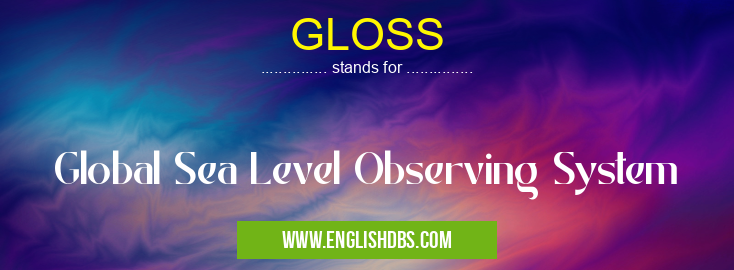What does GLOSS mean in OCEAN SCIENCE
The Global Sea Level Observing System (GLOSS) is an international programme that has been initiated by the Intergovernmental Oceanographic Commission of UNESCO. Its main purpose is to observe sea level data from different sites around the world and provide data for national and global climate activities.

GLOSS meaning in Ocean Science in Academic & Science
GLOSS mostly used in an acronym Ocean Science in Category Academic & Science that means Global Sea Level Observing System
Shorthand: GLOSS,
Full Form: Global Sea Level Observing System
For more information of "Global Sea Level Observing System", see the section below.
Essential Questions and Answers on Global Sea Level Observing System in "SCIENCE»OCEAN"
What is GLOSS?
The Global Sea Level Observing System (GLOSS) is an international programme that has been initiated by the Intergovernmental Oceanographic Commission of UNESCO. Its main purpose is to observe sea level data from different sites around the world and provide data for national and global climate activities.
What are the main aims of GLOSS?
The main aims of GLOSS are to make accurate, long-term measurements of sea level changes; to facilitate easier access to coastal sea level measurements in near real-time; and to coordinate activities related to sea level observations across different countries.
Who oversees GLOSS?
GLOSS is overseen by the Intergovernmental Oceanographic Commission (IOC) of UNESCO, which coordinates activities related to Global Sea Level Observing System operations worldwide.
What type of information does GLOSS provide?
GLOSS provides a range of sea level data such as tide gauge records, tide predictions, coastal ocean waves, temperatures, salinities and other oceanographic parameters that can be used for research applications as well as for policy decisions related to climate change adaptation planning.
How often does GLOSS collect data?
GLOSS collects data on a regular basis from more than 75 locations around the world. Data collection usually occurs every two weeks depending on the availability of resources at each site.
Final Words:
:GLOSS is an invaluable resource for understanding how sea levels are changing over time and obtaining essential information about coastal oceanography that can be used for both research purposes and policy decisions related to climate change adaptation planning.
